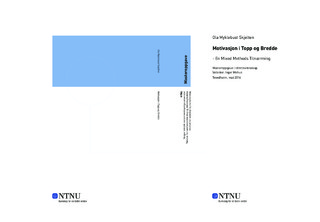| dc.description.abstract | The goal of this study is to investigate potential differences in the motivation for sport activities among amateur and elite athletes, and what these differences might be. The study is based on a mixed method approach where amateur athletes (n=90) and elite athletes (n=77) have filled out Norwegian versions of BPNES and BREQ-3, and where amateur athletes (n=8) and elite athletes (n=8) have participated in semi-structured interviews. The theoretical foundation of the study is based on the ”Self-Determination Theory” developed by Deci and Ryan (1985)
The quantitative results of the study show that sport participation among both amateur and elite athletes is mainly based on identified regulation and fulfillment of the need for relatedness. Elite athletes are to a greater degree linked to integrated regulation and fulfillment of the need for competence than amateur athletes. Amateur athletes are to a greater degree linked to intrinsic motivation, introjected regulation and fulfillment of the need for autonomy than elite athletes. Central findings from the qualitative analyses show that the foundations for fulfilling psychological needs and for the athletes’ goals and identifications with sport are further differences in motivation between the two groups. The fulfilment of autonomy, competence and belonging is among elite athletes largely based on a focus on achievement. Among amateur athletes the corresponding focus is on social relations. This seems to be key to how different elements in the prominent motivation regulations act. Among elite athletes, goals and identifications are often tied to achievements based on external comparisons. It appears that external goals of this kind are based on autonomous motives by being in line with the athletes’ values and life goals. Thus, sport participation, and its causality orientation, is to some degree governed by rewards, like “winning”. Amateur athletes tie goals and identifications with sport to a feeling of relatedness to a greater extent. Inner goals of this kind match the athletes’ values and interests. Their focus on belonging leads to them experiencing fewer forms of external control, which strengthens their internal motivation. However, the focus on relatedness seems to have a negative side in the form of experiencing internal forms of punishment in cases where sport participation is lacking. | nb_NO |
